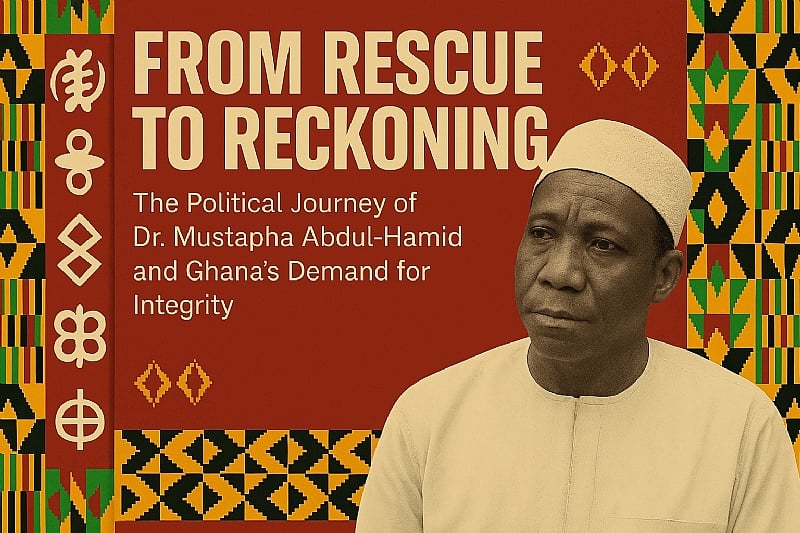I. The Promise of Rescue
In Ghana’s turbulent political landscape, Dr. Mustapha Abdul-Hamid emerged as one of the more poetic voices of moral reform. A devout Muslim and academic, he wove religion, politics, and conviction into a singular narrative of responsibility. As a long-time spokesperson for Nana Akufo-Addo and a founding voice within the New Patriotic Party’s (NPP) ideological circles, Mustapha was not just another partisan—he was a custodian of conscience. His teary 2016 pledge, “Walahi, we will rescue Ghana,” echoed beyond party lines. It was a solemn promise in a time of disillusionment.
His ascent was both timely and tactical. From the lecture halls of the University of Cape Coast to the corridors of government, he carved out a reputation for intellectual clarity and moral fortitude. But like many before him, governance would prove to be less a stage for idealism and more a crucible for its survival.
II. From Advocacy to Authority
With the NPP’s electoral victory, Mustapha transitioned from opposition theorist to Minister for Information—tasked with translating policy into public trust. Later, as Minister for Inner City and Zongo Development, he aimed to bridge structural inequality with targeted intervention. The peak of his executive responsibilities came in 2021 when he was appointed CEO of the National Petroleum Authority (NPA)—a crucial gatekeeper in Ghana’s energy value chain.
In this role, he championed reforms like the Cylinder Recirculation Model and reportedly enhanced revenue efficiency. His stewardship was seen as a move to sanitize a historically opaque sector. However, the very institution he sought to purify would become the epicenter of his greatest test.
III. The Scandal That Shook the Sector
In July 2025, the Office of the Special Prosecutor (OSP) announced sweeping charges implicating Dr. Abdul-Hamid in a GH¢280 million extortion and money laundering scandal. The allegations detailed a coordinated scheme between 2022 and 2024 involving unlawful demands on petroleum transporters and laundering through proxy companies—including Kel Logistics and Kings Energy.
Twenty-five counts were filed, encompassing conspiracy to commit extortion, extortion by a public officer, and money laundering. Assets traced to the proceeds included fuel stations, logistics equipment, and residential properties.
The indictment does not just challenge Mustapha’s legacy—it prompts national reflection. How does one reconcile lofty pledges of moral rescue with the machinery of alleged corruption?
📣 INFORMATION TO THE PUBLIC: CHARGES AGAINST DR. MUSTAPHA ABDUL-HAMID
The Office of the Special Prosecutor has filed 25 criminal charges against the former National Petroleum Authority (NPA) CEO, Dr. Mustapha Abdul-Hamid, and associates in connection with a GH¢280 million extortion and money laundering scandal. Below is a simplified list for public understanding:
⚖️ Main Charges Filed
Conspiracy to Commit Extortion – Coordinated efforts to unlawfully obtain money from petroleum companies under false pretenses. Extortion by a Public Officer – Abuse of official position to demand and receive payments outside legal channels. Conspiracy to Commit Money Laundering – Planning with others to conceal the origins of funds obtained through illegal means. Money Laundering – Actively moving, disguising, or investing funds acquired through extortion.
🏢 Entities Involved
Kel Logistics Ltd Kings Energy Ltd Propnest Ltd
These companies were allegedly used to channel and conceal illicit payments.
🧍🏽♂️ Key Individuals Charged
Dr. Mustapha Abdul-Hamid – Former CEO of NPA Jacob Kwamina Amuah – Coordinator of Unified Petroleum Price Fund Wendy Newman – Audit Staff at NPA Executives and directors linked to the laundering companies
🧾 Summary of Alleged Offense
Period: December 2022 – December 2024 Total Amount: GH¢280,516,127.19 Assets Acquired: Fuel stations, residential properties, and transport fleets
IV. The Mirror Held Up to Governance
Ghana’s civic community has responded with a mix of anger and resolve. Many see this case as a critical barometer for institutional credibility. The NPA, as a strategic regulator, is not merely a bureaucratic entity—it is the pulse of Ghana’s energy sovereignty. Allegations at this level suggest not just personal failure, but systemic vulnerability.
Citizens are demanding more than resignation or denial. They expect a transparent judicial process and a conviction, if guilt is proven, that will set a precedent. This isn’t merely about punishing wrongdoing—it’s about reaffirming the value of ethical leadership. The public’s desire isn’t vengeful; it’s restorative.
V. Legacy on Trial
For Dr. Abdul-Hamid, this trial marks a dramatic inflection point. If acquitted, he will need more than legal redemption—he will need philosophical clarity to restore moral authority. If convicted, the fall will be historic: a once-principled ideologue undone by the very system he vowed to reform.
But beyond one man’s fate, this moment belongs to Ghanaians. It is a chance to demand structural accountability, to question the character of leadership, and to reinforce that governance must be a covenant of service—not an enterprise of power.
The eyes of the nation will be on the courtroom, but the soul of the nation is asking a deeper question: Can we still believe in rescue, if its heralds falter?
Retired Senior Citizen
Teshie-Nungua
[email protected]


